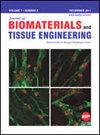Irisin Ameliorates Cerebral Vasospasm and Early Brain Injury in Rats with Experimental Subarachnoid Hemorrhage
IF 0.1
4区 医学
引用次数: 0
Abstract
Irisin is a cytokine mainly secreted by skeletal muscles, widely distributed in the body with functions of anti-oxidation, anti-inflammation, prevention of reperfusion injury, immune stimulation, and reduction of cerebral infarction. In this study, rats with subarachnoid hemorrhage (SAH) were used as experimental subjects, and irisin was injected intraperitoneally to investigate irisin’s effect on cerebral vasospasm and early brain injury (EBI). After establishment of the animal model of SAH, animals were administered with irisin through intraperitoneal injection. The animal tissues were taken out to assess the morphological changes, and neurons apoptosis by TUNEL staining and Nissl staining. Brain edema score was used to assess the severity of brain injury, and the relationship between related signal pathways was detected by Western blot. Administration of irisin significantly reduced cerebral vasospasm and decreased neuronal apoptosis induced by SAH. Irisin inhibited the apoptosis of prefrontal cortex mitochondrial neurons, and decreased Bax/Bcl-2 and cytochrome C in the cytoplasm. The expressions of PSD-95 and GAP-43 and BDNF in brain tissues were decreased upon SAH, but their expressions were partially restored after treatment with irisin. Irisin decreases neuronal apoptosis and mitochondrial function with up-regulation of synapse proteins, thereby exerting a protective effect on EBI and SAH.鸢尾素改善实验性蛛网膜下腔出血大鼠脑血管痉挛和早期脑损伤
Irisin是一种主要由骨骼肌分泌的细胞因子,广泛分布于体内,具有抗氧化、抗炎、预防再灌注损伤、免疫刺激、减少脑梗死等功能。本研究以蛛网膜下腔出血(SAH)大鼠为实验对象,腹膜内注射鸢尾素,研究鸢尾素对脑血管痉挛和早期脑损伤(EBI)的影响。在建立SAH动物模型后,通过腹膜内注射给动物施用鸢尾素。取动物组织,用TUNEL染色和Nissl染色观察其形态学变化和神经元凋亡。脑水肿评分用于评估脑损伤的严重程度,并通过蛋白质印迹检测相关信号通路之间的关系。鸢尾素的给药显著减少SAH诱导的脑血管痉挛和神经元凋亡。鸢尾素抑制前额叶皮层线粒体神经元的凋亡,降低细胞质中的Bax/Bcl-2和细胞色素C。SAH后脑组织中PSD-95、GAP-43和BDNF的表达降低,但用鸢尾素处理后其表达部分恢复。Irisin通过上调突触蛋白来降低神经元凋亡和线粒体功能,从而对EBI和SAH发挥保护作用。
本文章由计算机程序翻译,如有差异,请以英文原文为准。
求助全文
约1分钟内获得全文
求助全文
来源期刊

Journal of Biomaterials and Tissue Engineering
CELL & TISSUE ENGINEERING-
自引率
0.00%
发文量
332
审稿时长
>12 weeks
 求助内容:
求助内容: 应助结果提醒方式:
应助结果提醒方式:


